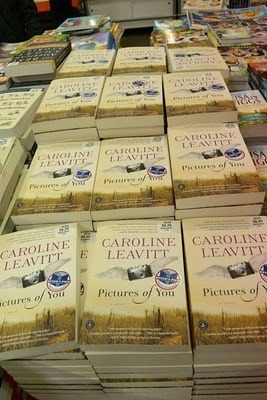Caroline Leavitt's Blog, page 129
February 23, 2011
Craig Lancaster talks about The summer Son and the power of perspective
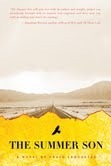
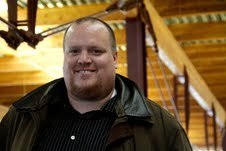
Got a guest post for you today: Craig Lancaster has a terrific new novel out and it's got a blurb by superstar Jonathan Evison! There's a way cool trailer, too. Thank you, Craig for offering to write something on my blog!
THE SUMMER SON AND THE POWER OF PERSPECTIVE
By Craig Lancaster
Want to see me seize up and turn into a babbling moron? (Every girlfriend I've ever had seemed to delight in it, so it must be fun.)
Ask me what my novel The Summer Son is about.
It's not that I don't have an answer for you. It's that I have several.
The simple answer: It's the story of a son's attempt to reconcile with his father.
The more complicated answer: It's a story about perspective, and about the ways that secrets and pain reverberate for generations.
The answer I want to give, every time: It's about whatever you find in it. If I've done my job well, there's plenty of room for interpretation.
Now, all of that said, I didn't find out what the story meant to me until I was well into the third draft. The first attempt was smartly dismissed by my most trusted reader as half-novel, half-essay, and not very satisfying on either count. The second got closer to what I was seeking but still lacked that central notion that guides me as a writer: Why does this story need to be told?
Mitch Quillen, my protagonist, has been separated from his father, Jim, for the better part of 30 years, a state of affairs that Mitch ascribes to Jim's unforgiveable actions during the summer of 1979, when Mitch was 11 years old. Thrown together in 2007, when Mitch is 39 years old, father and son crash into the past even as they move through the present. Meanwhile, Mitch is exorcising 1979 in the form of long notes to his wife, who is clinging to their fraying marriage.
The twin storylines allowed me to reveal the decades-earlier source of Mitch's pain at the same time he's making discoveries in the here and now, information that might cause him to reassess his violently flawed father. It seems to me that a lot of intractable family situations fall along these lines. Something is said or done, the intention of the offending party doesn't match up with the interpretation of the wounded party, and the relationship becomes lost in all the recriminations and baggage that get piled up as years slide by. I've seen it in my own life, with people I want to shake and say "Why can't we talk this out?" Maybe I should do that.
Mitch, a sensitive boy, comes to his view of his father honestly, and I suspect that many of us, given the same vantage point, would reach the same conclusion. Jim, having endured his own horrible childhood, has secrets he won't part with and knows things about that long-ago summer that could ease Mitch's mind. In The Summer Son, unraveling the past unlocks the possibilities of the present. Somewhere in all of that, perhaps there's a way to end the vicious cycles that pull us under, generation after generation.
Jodi Picoult talks about Gay Rights, Infertility, and her new novel, Sing You Home
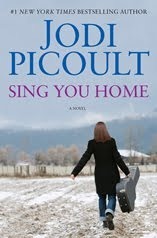
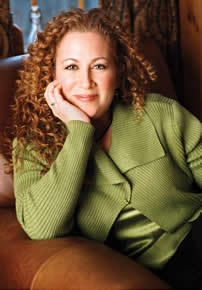
I can't tell you how thrilled and honored I am to be interviewing Jodi Picoult here. A number one New York Times bestselling author of 18 novels, the prolific Picoult tackles hot button issues by giving them a distinctly human face. In the sublime--and important-- Sing You Home, she writes about infertility and gay rights--which couldn't be more timely. A multimedia experience, the book also comes with a CD of songs that Jodi cowrote. I also want to say that Jodi is one of the most truly generous writers on the planet, with a heart the size of Jupiter, and she's also hilariously funny to boot! (Plus, she has amazing hair.)
Thank you, thank you, Jodi for taking time out of your crazily busy schedule to answer my questions.
You're an author who truly seems to inhabit your characters, and you create arresting, sympathetic portraits of people we might not initially be so sympathetic to. How difficult was it to create someone like Max, a fairly intolerant member of the Christian Right? Can you talk a bit about the process?
It was really hard to create Max. He had to be a sympathetic character but his views are (to me personally) abhorrent. I had to make him almost befuddled, so that he truly believes in what he's saying without realizing how hateful it is to some of the people who hear it.
That also meant doing research with an evangelical Christian group opposed to gay rights. I interviewed representatives from Focus on the Family,a group that supports the Defense of Marriage Act, opposes gay adoption, and (under the umbrella of Exodus International, which has since taken over) offers seminars to "cure" gay people of same-sex attraction. Like Pastor Clive in my novel, their objection to homosexuality is biblical. Snippets from Leviticus and other Bible verses form the foundation of their anti-gay platform; although similar literal readings should require these people to abstain from playing football (touching pigskin) or eating shrimp scampi (no shellfish). When I asked Focus on the Family if the Bible needs to be taken in a more historical context, I was told absolutely not – the word of God is the word of God. But when I then asked where in the Bible was a list of appropriate sex practices, I was told it's not a sex manual – just a guideline. That circular logic was most heartbreaking when I brought up the topic of hate crimes. Focus on the Family insists that they love the sinner, just not the sin – and only try to help homosexuals who are unhappy being gay. I worried aloud that this message might be misinterpreted by those who commit acts of violence against gays in the name of religion, and the woman I was interviewing burst into tears. "Thank goodness," she said, "that's never happened." I am sure this would be news to the parents of Matthew Shepherd, Brandon Teena, Ryan Keith Skipper, or August Provost – just a few of those murdered due to their sexual orientation - or the FBI, which reports that 17.6 percent of all hate crimes are motivated by sexual orientation, a number that is steadily rising.
One of the great joys about Max is that he, as a character, espouses a journey I hope that some people also take when they read my book. He begins with an opposition to gay rights because of what he's been told to believe by others. But when he tries to hold these beliefs up against the reality of the gay people he knows - and has loved - he sees that disconnection, and ultimately makes a decision not based on religious dogma but on personal ethics.
You seem to have your finger on the pulse of America in the topics you choose. Infertility and gay rights could not be more timely. Was there a moment when you knew this was the next novel? Or was there an image that jumpstarted the story for you?
It was the gay rights angle. I really think that's the last civil right we have last to grant in the US and I wanted to explore the issue, and to see why those still opposed to gay rights are opposed. I'm a little stunned, given the previous controversies I've written about, that this one is the most offensive to some readers - who without even seeing the book, have said they refuse to read it because "of what it's about." Really?? Someone else's sexual orientation is more upsetting than, for example, the sexual abuse of children by priests?? But I like stirring the pot and getting people talking. However, this subject became a much more personal quest for me when my oldest son came out to me during the writing of the book. Suddenly, I wasn't just writing something theoretical; I was hopeful the book could open minds enough so when Kyle wants to marry and have a family, it's not a struggle.
I find it amazing and wonderful that you are always pushing the envelope, and Sing You Home is your first multimedia tour. Can you talk about how the idea of writing songs to go along with the novel came about? What was it like writing songs? And if every life has a soundtrack, what's yours? And wait--one more question--what other creative avenue might you be exploring next?
People who oppose gay rights often don't know someone gay very well. If you do – if you have a relative or teacher or butcher who's gay, you know they're just ordinary people. I wanted readers to get to "know" someone gay – and Zoe's the one I picked. I wanted readers to really listen to her. I could have given her a first person narrative (and did) but I wanted to go one step further. I wanted you to literally hear her voice, hear her pour her heart out to you in her songs…and THEN see if they can still dismiss her dreams of marriage and a family. My friend Ellen and I have collaborated before on original children's musicals that are performed by a local theater troupe to raise money for charity every year. We've done over 100 songs together, with me writing lyrics and Ellen writing music. So I asked her if she might be interested in a different kind of project, and she was very excited to be part of it.
My playlist? Great question…I'd say "Deathly" by Aimee Mann, "Jesus Etc." by Wilco, "Rhythm of Love" by the Plain White Tees, "Beautiful Life" by Charlotte Martin, "Wreck of the Day" by Anna Nalick, "Never Saw Blue Like That" by Shawn Colvin, "Skin" by Rascal Flatts, "Taylor the Latte Boy" by Kristin Chenoweth, "The Way I Am" by Ingrid Michaelson, the Ragtime soundtrack, my son Jake singing "On the Street Where You Live," and every single song on the Sing You Home soundtrack!
Next creative avenue? I don't know yet! It would have to be organic, the way The Tenth Circle took you into a graphic novelist's head and this book takes you into the heart of a musician. These aren't bells and whistles - they're different ways to take in a story, and they enrich the knowledge of the characters on the page.Has being famous changed the way you write? Obviously, money is not a concern, but I'm really interested in the creative process.
Yeah - I have less time!! I have a really hard time saying no. I'm getting better, but still...I get about 25 requests a week to speaking engagements. I receive over 200 fan emails a day and I read and answer each one - I don't have an assistant or anything. But then I also get people asking me to send a letter to their grandma for her birthday, or to come to show and tell at their daughter's classroom -- sometimes it feels that fame is just another way of saying that everyone wants a piece of you. Don't get me wrong - it's a nice problem to have - but it still infringes on the time I have to write. For example, I'm doing so much advance media for Sing You Home that the "writing hours" are being eaten up...and that means staying up till about 2:30 in the morning writing each night so that I can finish a draft of the 2012 book before I leave on book tour.
I love your "What the heck do you mean by the end of..." questions on your blog. As someone who loves books that have a sort of never-ending story quality to them, I love it that your books don't tie things up or have easy answers, that readers are pushed to question what they think they know. Has any ending of any of your books stunned you by its unexpectedness? Did you ever start out having a definite viewpoint on one side of a topic only to find yourself on the other side when you had finished the book?
I've never changed my point of view about a controversial issue, but I have changed my reasons for believing what I believe. That happened when I began to research the death penalty for Change of Heart. And although I've never changed an ending, I am CONSTANTLY surprised by the way I get there. In Sing You Home, I had no idea that Max had a crush on his brother's wife until I started writing him. The whole time I was typing, I was thinking, "No no no, Max. Bad idea!" But of course I couldn't wait to see what trouble he got into.
What question didn't I ask you that I should have?
Do you expect backlash from people because you are writing about homosexuality?
And my answer: Let me tell you a little story that happened last week! I am doing a literary salon event in NYC that will be broadcast live. A website called Premiere Collectibles was going to sell autographed books to anyone who watched and wanted one. They offered to donate $2 of each sale to a charity of my choice. Great, right? I told them I wanted to donate to the Trevor Project, which provides support to gay teens. Well, all of a sudden they called my publisher and said they'd be happy to cut me a check to make a personal donation to the Trevor Project…but that they are an evangelical Christian company and worried about offending clients…so they couldn't put that info on the website. Immediately, my publisher told them they could not sell my books, and that I wasn't gonna be happy. I started tweeting about this, and my fans wrote emails to their customer service people about how it's not a particularly Christian attitude to ignore suicidal gay teens – and all of a sudden, they called back the publisher. They had had a change of heart due to all those emails, and decided we were right, and they are now proudly supporting the Trevor Project on their website as a partner for donation. I think that Sing You Home will unfortunately alienate some readers whose minds are too narrow to let in light (to quote the lyric from one of the songs on the book's CD). However, if even one mind is changed – if even one person who was anti-gay rights suddenly decides maybe there's a point to equality for all – well, then I know I've succeeded.
February 16, 2011
What I learned touring
1. Always check for bedbugs at every hotel. Even when you are so exhausted you sort of don't want to.2. Contrary to popular belief, airports sometimes have great food! I slogged past a McDonalds and a Starbucks and the usual tired pizza to find this little restaurant tucked in the wall that had penne and smoked gouda with truffle oil and a fresh green salad for only ten bucks. Even better, they had a wine list to die for!3. Pack light. You can sleep in your clothes. I learned this when I forgot to pack pajamas.4. If your suitcase is still too heavy, smile charmingly at the men in front or behind you on the plane so they will gladly help you hoist your bag up.5. Room service is God's gift to authors. And sometimes you get a cloth napkin and flowers and sometimes it's just paper. But it's still God's gift.6. Literary types do love reality TV. (I learned this at an AWP dinner!)7. You CAN wear the same dress three days in a row and not want to kill yourself.8. No matter how much you check, you will lose things. Sigh. Wish it wasn't the synopsis of my new Algonquin novel, though. But I do have a copy on my computer. Not marked up though. And I lost my speech. But I remember it.
I had a blizzard in Connecticut, a blizzard in Boston where the city closed down at 9 (thanks to the wonderful Brookline Booksmith who kept the store open and got a crowd to come!), a blizzard in Chicago where a drawbridge began to open as I was sliding across it, sub-zero temperatures in Cincinnati and Kansas City, and rain in LA!
I love touring, love meeting the booksellers and the readers and I deeply apologize to the woman in Kansas City who had to ask me a question three times and I still didn't get it.
And please, check out my tour at www.carolineleavitt.com. Come and meet me!
January 30, 2011
Jo-Ann Mapson turns the tables and interviews ME
Jo-Ann Mapson is a stellar author and also a friend and she's interviewing me, here! thank's Jo-Ann!
I'm turning the tables on Caroline Leavitt, the incredibly talented writer, inspiring teacher, who so generously blogs about everyone else's writing.
Pictures of You is the story of two women, unhappy in their marriages, whose lives literally collide in a car accident. April dies, but Isabelle survives, with guilt is so enormous she feels compelled to become involved with April's husband and young son. It's a lot more complex than that, but I don't want to spoil anyone's reading experience.
When I began to gather questions to ask you, I picked up the book again—and read it all the way through. A book that stands up to and begs for multiple readings is a great book, in my humble opinion. It's exciting that Pictures of You has gone into multiple printings before it's pub date. There's a real buzz about it, and I hope it leads to good things.
The characters in this story are so real. Some haven't finished high school. Others have asthma. Overprotective fathers misinterpret things. Mothers we'd like to forget are driving forces.
Can you tell us about creating April, Sam, and Charlie? Where does your inspiration for them come from?
I started the book with just the image of a car crash, and a woman standing the wrong way in the road, with a little boy running off to the side. Originally April was much darker but I began to realize that it would be much more complex if she was more complicated, if there was a part of her that people could relate to or even feel for. Sam originally didn't have asthma, but when it showed up, I didn't want to write it. I had suffered through a terrible childhood with asthma (it's very mild now), and the last thing I wanted to write about was the shame and grief and terror of that time. But it kept coming back, and in lavishing my attention on Sam, I seemed to have healed my own shame about my past!
Charlie, to me, was your basic good guy who comes to realize that he didn't really know the woman he loved best in the world, and he gradually comes to also realize that it was his own fault. That he saw what he wanted to see. I found that so fascinating.
There's also a sense of overlapping mysteries—April had a secret life, Charlie has her investigated. Sam is friends with the dangerously unsupervised Teddy. How did you use suspense techniques in this story?
It's funny you asked that because this is actually my first book where I've really tried my hand at suspense. A lot of the time I just didn't know what I was doing and some of it actually came about without my knowing it. (Just now when you asked about Teddy, I thought, "Oh, yes! I can see that!" But it wasn't intentional.) But as I was writing, the idea, "What happened that day? What really happened?" kept beating like wings in my head, and that propelled my writing.
Talk about the role of parenthood/motherhood in this book.
I gave Sam three kinds of parents. April, his mother, yearns to be perfect and yet does some really dangerous things. When he's sick in the hospital, she gives him peanut butter and enrages the nurses. Yet, she is determined to make him feel that even with asthma, his life can still be special and an adventure. Charlie also wants to be a perfect dad, but he's overcautious. He doesn't push communication, which causes a lot of mistakes. Isabelle is sort of the ideal. She respects Sam. She opens his world by teaching him photographer, and she's very open about saying what she thinks and feels. She's all about seeing what is really there, and going deeper and deeper until you do.
There's a hornet inside Isabella's car. Luke hides a picture of Isabelle and himself in a wall. Sam reads up on angels. Even Nelson the unsociable tortoise has personality. How do you find those details to make characters and setting so realistic and at the same time so human?
I wish I knew. Sometimes I think my mind is just a repository of details from my life or from the lives of my friends and I remember them at the right time. I'm afraid of hornets in the cars. My husband and I hid a photo of ourselves in a wall. I had a tortoise for many years who was also cranky as all hell. With Sam, it was just the vision of a little boy reading about this whole angel world.
This book is different from your others particularly in the time frame. We get to see characters in the future. Why was that important to the story?
That leap ahead just came out of nowhere, but as soon as it did, it felt like a gift. I had been floundering around, trying to figure out the right end, and suddenly, I felt this jump ahead was exactly the way to end the story. I always feel that I want novels to be "never ending stories." You turn the page and you still feel the characters are living their lives, that things go on. It was important to me to see how Sam turns out, and I couldn't do that unless he was also an adult at some point.
What question didn't I ask? And what are you working on now?
You could ask me, how can people find out where you are touring so they can come so you won't have to read in front of three people? My website http://www.carolineleavitt.com has all the details. Also, does writing get any easier? The answer is no. Every book is different and in a way, it gets harder. Right now I'm working on a novel set in the late 50s and early 60s in suburban America, which is due to Algonquin in 2012.
Joy, Joy, Bliss Bliss!
January 29, 2011
Hope Katz Gibbs talks about Truly Amazing Women
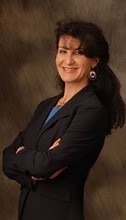
Hope Katz Gibbs, is a truly amazing woman. And she's also the author of the book, Truly Amazing Women Who Are Changing The World (check out the website). I was so enamored of this project, I asked Hope if I could pepper her with questions. Thanks, Hope!
Where did the idea for Truly Amazing Women come from?
Having been a journalist since graduating from the University of Pennsylvania in 1986, I got used to being the only woman at the editorial meeting. When we'd be pitching story ideas, I'd be the one saying, "You know, we really should write about more women."
Luckily for me, when the editors gave the nod (persistence is one of my gifts), I was the one assigned to write the story. And I have had the honor of profiling hundreds of amazing women in my career.
But the idea to write the book came to me in April 2008 after attending two events filled with amazing women in one single day. The first was a luncheon hosted by Nechama Shemtov, the leader of an influential Jewish DC organization called Aura, held at the DC residence of the Ambassador of Colombia. Speakers included Fran Drescher, Hadassah Lieberman, Rep. Shelley Berkley of Nevada, and Holocaust survivor Nesse Godin. More than 200 of Washington's elite ladies filled the room.
Hours later, I headed over to a fundraiser for Hillary Clinton at the home of DC philanthropist Edie Fraser. I again found myself in the presence of dozens of amazing women — all of them banding together in an effort get a truly amazing politician elected president.
Over coffee the next morning, as I recounted the previous day over coffee with my husband, illustrator Michael Gibbs, he said, "You know, you should write a book." That day, the website was born was born. So I credit the creation of Truly Amazing Women to my amazing man.
I've been loving your website, www.TrulyAmazingWomen.com, particularly the reasons "why she did it," which really illuminate the whole creative process. What do you, personally, think makes an amazing woman?
I am so glad you like this approach, because my goal is to give time-strapped readers a snapshot of what the women do, and why they do it, as a way to inspire others to step up and become the amazing women they can be.
As for what makes someone "truly amazing," well, that's a little tricky. On the one hand, it's pretty obvious that Oprah Winfrey is amazing — especially with her Angel Network. Ditto for other women in the public stratosphere who are doing incredible, tireless work, such as Hillary Clinton, Michelle Obama, Jordan's Queen Noor, among others.
But they really don't need any more press. So the goal for this book is to highlight women who are making changes in their own way. Sometimes it is a smaller contribution, such as Kim Valentini who founded the Smile Network International and brings in doctors to do plastic surgery on poor children with cleft lips. And there is Carolyn Kellams, founder of Keep Your Freedom, Keep Your Dreams, which trains tee parents in California to teach others how to prevent teen pregnancy.
In addition to featuring incredible nonprofit founders, I also highlight entrepreneurs, authors, educators, and other women who are making a difference in the lives of others. For me, an amazing woman is someone who has dug deep inside, pushed past her demons, and sticks to her mission despite the obstacles.
You have a proposal for women to fill out, on how they are amazing, which I want to tell everyone here about. Have you found that women are reticent about promoting themselves or that they might think they are not amazing (when they clearly are?)
Of course! We're women, right? We are conditioned to promote others, shy away from the limelight, and downplay our amazingness. Of the 100-plus profiles that I have posted so far on www.trulyamazingwomen.com, nearly half of them required me begging, cajoling, sharing a bottle of wine, and (twice) doing a little dance to convince her.
Believe me, I understand the reason some women hold themselves back. But one of the things that I think I do well is to see the brilliance in others. I have made it my mission to bring that to light. It's a fascinating sociological aspect of this project, isn't it? That so many truly amazing women don't admit to, or fail to see, their amazingness? And perhaps worse, they don't think they are making a difference. If I can accomplish anything with this project, it would be to shift how women think of themselves.
There is something incredibly empowering about claiming your power, saying, "Yes, I'm amazing," which I love. It's also incredibly empowering to realize that you can make a living at what you love to do. Do you find, in a way, that these tough economic times are in a way a gift, a now-or-never moment for people to find and follow their bliss?
Well, nothing polishes the diamond like adversity, right? In fact, I compare the bad economy to a forest fire that has burned down our old ideas about what is right and necessary. In its place is a fresh landscape where we can reinvent ourselves. It's not a pretty process, but it's fundamental to the nature of how society works. Personally, I love the idea of throwing off old models that, if we are being honest, didn't work so well in the first place, or have outlived their usefulness. Change is painful for all of us. But, for perhaps the first time in our adult lives, we can all try a new approach. I can't wait to see what all the truly amazing women out there do with this opportunity.
Tell us about the documentary you are planning to do?
As with everything worth doing, it's a process. Right now, I am diving into a world that I never fathomed I'd be invited into, and am currently talking to a major cable network about turning the profiles into a TV series.
And how I got to this place demonstrates the power of women. Through Facebook, I met San Francisco video editor Susan Utell, who gave me the idea to turn the book into a documentary. That led me to connect with video and TV producer Ann-Marie McHugh of Quincy Productions in New York – whom is the new videographer working with my PR firm, Inkandescent Public Relations. Another girlfriend suggested we pitch it to this well-known cable company where she has a contact. Amazing, huh?
Here's the idea for the show:
I want to profile three women in each episode. The first would be a woman who is high profile, such as Fran Drescher, who founded Cancer Schmancer; or journalist, author, and first lady historian Cokie Roberts.
The second would be a woman who is also known, but not a household name, such as Gail McGovern, who heads up the American Red Cross, and Josette Sheeran, the leader of the UN World Food Programme.
The third woman is one who is flying under the radar, yet making tremendous changes in people's lives, including cancer researcher Stephanie Bunt, who created a fundraiser called "Miles for Miles" to raise money for a friend with the fatal disease, progeria. And there's Molly Barker, founder of the international nonprofit organization, Girls on the Run, which encourages middle schoolers to put on their running shoes and stay fit.
Each would be featured, documentary-style, and share their story, dreams, and accomplishments. Each woman will also offer a leadership lesson that others can apply in their own lives. To me, the most interesting element of each segment will be the teaching component, so that viewers come away saying, "If she can do it, I can do it." I hope to start a revolution!
Are there any questions I didn't ask that I should have?
I think you covered everything. I can't thank you enough for helping me spread the word, and forencouraging more women to appreciate their own awesomeness. Anyone who is interested in being included in this amazing project can submit a proposal at http://trulyamazingwomen.com/submit-proposal. And, I encourage everyone to read the January 2011 issue of The Costco Connection, where I had the privilege of interviewing you about your new book, "Pictures of You:" Congrats on being the Penny's Book Pick of the Month!
January 26, 2011
See You In A While, Crocodiles

My red cowboy boots, my black dresses and I are off on book tour for PICTURES OF YOU!
I'm fantastically excited, thrilled, honored and jazzed. I'll be sending photos to FB and reports, and I'll be back here towards the end of Feb. before I have to jaunt off again on here and there visits, taking me through May.
PLEASE Check out my tour, the news, the reviews, at www.carolineleavitt.com.
Please come and say hi. I promise to draw coffee cups in your books and give you a hug.
Ellen Meeropol talks about House Arrest
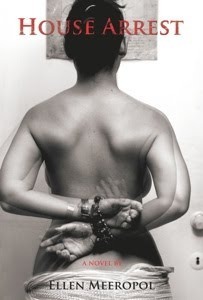
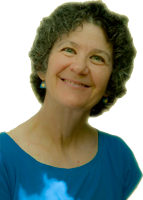
Ellen Meeropol's House Arrest is well...arresting. Heidi Durrow calls it "a compelling debut" while Julia Class raves that it is "smart, provocative, and moving." I want to thank Ellen for answering all my pesky questions here.
What particularly impressed me about House Arrest were all the moral choices going on. Both Emily and Pippa have to make a choice about whether or not to break the law, for their own reasons. How do you go about crafting a character?
The spark for this book was a short article in the Boston Globe about a nurse who was assigned to monitor the pregnancy of a cult member. Her patient was under house arrest pending investigation of the death of a child living in the cult. It captured my interest so I clipped the article and put it in my "ideas" folder. A few years later, I still occasionally found myself wondering what it would be like for a nurse to build a therapeutic relationship with a cult member, with some whose health beliefs were so different from her own, and decided to explore the story. In my imagination, the nurse and an Isis cult member became friends and the novel's ethical dilemma developed from that friendship. I had no idea where the narrative would go, but I knew the conflict had something to do with the care-giving relationship and with prejudice against the cult.
When I'm crafting characters, I often imagine them Thumbelina-sized, sitting on my shoulder and whispering their secrets into my ears. Perched on one shoulder, reserved home-care nurse Emily told me about her childhood in Maine, how she lost her parents because of their political activism, and how she believes that living by the rules will keep her safe. On the other shoulder, Pippa revealed what she discovered about her father, and why she had to leave Georgia, and how the Family of Isis welcomed her.
A sense of place and the natural world are important to the way my characters grow. House Arrest is set in the Forest Park neighborhood of Springfield, Massachusetts, where I lived for many years, and on an island off the coast of Maine, where most of my fiction takes place. I work surrounded by hand-drawn maps and elaborate family trees, grounding my characters in our shared imaginary world.
You come from a background of nursing which infuses this novel. How different is Emily from you?
I worked for many years as a pediatric nurse and nurse practitioner, particularly with children with spina bifida, the condition that Emily's beloved cousin Zoe has. I never did home care, so I had to learn from colleagues in that field. I have worked with patients from different cultural backgrounds, people who have wonderfully varied ways of looking at health and illness, and I've always been fascinated by those differences.
Emily is not based on me (for one thing she's half my age) but aspects of her character are drawn from young people I have known whose activist parents made choices that had terrible consequences for themselves and their families. Emily is haunted by her parents' actions and frozen in her own life. Nursing is a way for her to connect with people and she's good at it.
I read that you didn't begin writing fiction until your fifties. Why not? And what jump-started your desire? What was that like?
Some days I wish like anything that I had started writing much earlier. That way, maybe I wouldn't be publishing my first novel and applying for Medicare at the same time! I've always read a lot, and I often thought about writing fiction. For many years I scribbled ideas on napkins and corners of the newspaper and collected them in that "ideas" folder. But it wasn't until 2000, when I was planning a two-month "sabbatical" so that my husband could write his book, that I realized that it was a perfect time for me to jump in too.
We rented a cottage on that island off the coast of Maine that I mentioned before; there I met my muse and she literally changed my life. I wrote all the time. Three years later, I entered an MFA program and then I took early retirement from my nurse practitioner job. Re-inventing myself in my fifties was both humbling and exhilarating. Regardless of my age and my past life as a competent profession, I was a beginner again, free to experiment and make lots of mistakes. It continues to be a terrifying and liberating experience.
The novel talks a lot about forgiveness, and how whether we actually should forgive. Do you think there ever is anything that is unforgivable? Should compassion rule us more than our laws?
I don't really have an answer for that question, Caroline. Whether or not to forgive something that feels unforgivable is such a personal decision. If I wanted to tell people how to live, I'd write essays or self-help books. As a person and a writer, I'm fascinated by situations in which well-meaning people make questionable decisions that have awful consequences and novels let me explore those stories, with made-up characters. For my characters, sometimes forgiveness is the only way to heal.
Can you talk about your writing process?
I'm a seat-of-the-pants writer. I start with a character, or a scene, or sometimes an image, and follow it to see where it takes me. I write at the computer, in a very messy office strewn with books and papers and magazines and folders and notes and maps and photographs. I've never made an outline, although I've often wished for one. I once heard E.L. Doctorow say that for him writing a novel is like driving on a dark road at night, with only your parking lights for illumination. You can only see ahead a short distance, but that's all you need to keep going. I'm working on my third novel manuscript now and am just beginning to trust the process.
Another part of my process is having multiple narrators. I love reading books that offer the story from several points of view, and that seems to be the way writing narratives develop for me as well. The stories that fascinate me often involve complex perspectives. I enjoy developing my novels by alternating between four or five characters, taking turns sitting on my shoulders and opening their hearts to me.
What's obsessing you now in your work and why?
No matter what I'm writing, my obsessions tend to poke their nose into my characters' business. In general I am obsessed by the way family legacies shape our lives, and by the interplay between our actions, especially relating to political activism, and the consequences of those choices.
Right now I'm working on a manuscript about a university professor who is kidnapped and taken to a civilian detention center on an island off the coast of Maine for interrogation. This is new territory for me and this book is frightening to write. One of the multiple narrators is a guy who believes that torture is warranted to protect national security. It's enormously challenging to try to inhabit this character in order to write his scenes.
What question didn't I ask that I should have?
You didn't ask me what the biggest surprise has been so far in the debut of my first novel. My answer would be the generosity and bigheartedness of other authors (like you!) and by readers. Publishing literary fiction is such a difficult business; there are so many books and so little space for "success." But I've been amazed by the welcome from established authors, by the support, the blurbs, the suggestions, the camaraderie, and the generous response by readers. Thank you!
January 25, 2011
BOOK GIVEAWAY!
January 19, 2011
Robb Forman Dew Talks about Being Polite to Hitler
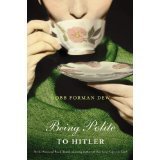
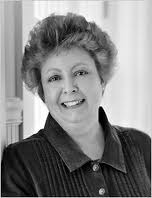
I first met Robb because of a letter I wrote to her. Instantly, she responded, and she was so warm and friendly, that I kept writing to her. We've become friends--and she's truly one of the most important people in my life. A brilliant writer, she has the ability to tunnel so deeply into her characters' lives that you swear that any moment, they are going to ring your bell. Being Polite to Hitler moves through memory and history, the political and the personal with effortless grace. I loved the book--and I love Robb, too. Thanks, Robb, for answering my pesty questions.
Being Polite to Hitler is funny, moving, and so, so blazingly alive, thanks to your gorgeous, evocative prose. What's most wonderful for me, is Agnes, who I've devotedly followed through the first two novels, who actually reaches her 70s in the novel, with an inner life that is just as sparkling as her outer one. When you began writing about her, did you ever expect her to end up the way she did?
When I began this trilogy I didn't think Agnes would be the focus of any one of the volumes. I had in mind something along the lines of Faulkner's Snopes trilogy. I thought I was going to be able to illustrate the rise and fall of a family within a community. But Agnes just...well, she had a world view that I hadn't imagined tackling, and I became more and more intrigued. And, as a matter of fact, in the first draft of BEING POLITE TO HITLER Agnes died. But it was too neat. No one dies that conveniently, and the last line of the book popped into my head and bothered me for weeks while Agnes was still dead.
This is your third book centered on the extraordinary and wonderful Agnes (and her family) of Washburn Ohio. The times have changed and we are now in post WWII America, with a familiar cast of characters. Did you always see these books as a trilogy?
I did see them as a trilogy, but initially there was a novel that precedes THE EVIDENCE AGAINST HER. It began about 1830 with the Scofield family, who were hard-scrabble farmers in Pennsylvania. But I suddenly found myself trapped in what is always referred to as "Historical Fiction," and I didn't want to have to wrestle with those assumptions about what I was after. Of course, then people assumed that EVIDENCE was historical fiction, which drove me crazy!
You have an enviable ability to show just how fluid time is, but I'd also say that you have a knack for showing how fluid family is, as well, and how people continue to impact the lives of others. Would you comment on that?
I'm often asked that question, and I once found myself arguing with my students, in a class I was teaching at Iowa, that if Henry James did say that a writer couldn't use a universal narrator (which my students had been mysteriously talking about as a "universal P.O.V.") that he was simply wrong. I had been so worried about not having any idea what a P.O.V. was that it took me quite some time to make my point. I don't think that is exactly what he said, because whatever works, works! I wish I had a choice in the matter, but I cannot think of time as static, nor can I think of a person as ever separate from his or her experience.
The problem for me is that everything that is always true, is always true all of the time. I work very hard to separate the pointless from the significant in conveying character and family, and at one point in the novel previous to this one, my husband was reading a section for me--which I couldn't do without, but which I don't always accept graciously. He came to find me and spread the marked pages out to show me. "You know, sweetie, I just don't think the history of WWII is your story," he said. I was appalled, because I had become fascinated with various treaties and little known meetings.
"How can you SAY that? I need my audience to know what's going on in the world..."
"Well," he said, "but, you know, there are other sources." Charles teaches American History, and I threw away about 150 pages which would have been deadly boring to anyone but me--and would even have been boring to me the second time around.
I love all the history threaded through the narrative. What was the research like for you, and given the historically rich periods the novel covers, how did you decide what to use and what to discard, particularly as the events impact the characters?
Don't you think that we are entitled to the memories of, say, our grandparents? If we live in a household that is saturated with the stories told by the people we live with, then those stories, filtered through their telling, and also filtered by our affection or dislike of the story-teller...Well, it's absurd to imagine that those stories aren't possessed by us as memories, too. I was about six years old when my parents and Red Warren and Cal Lowell--probably Peter and Eleanor Taylor, Alan Tate--I can't remember exactly who was there--but they and my parents and my uncle got into what turned into a spirited discussion in which eventually they settled on the fact that if a person preferred Benny Goodman to Artie Shaw, then it was inevitably the fact that that person would prefer Tolstoi over Dostoevsky. And vice versa: If you liked Artie Shaw then by rights you must prefer Dostoevsky over Tolstoi. I wasn't old enough to understand what was being debated, except that it was being debated with deeply earnest intensity. I was an argument that was never resolved in my extended family, and it was a moment that I claim as a memory of my own.
I loved doing the research for the first book, because the book was dependent on my perceptions of that era. I became fascinated--oddly enough--with the huge Corliss engines eventually built by Scofields and Sons, a company, of course, which was invented. In fact, I spoke to a wonderful woman in Dayton, Ohio, at The National Cash Register Company which houses the last extant Corliss engine, and she went down to the works and held her phone out so that I could record what it sounded like. I was astounded at the sound--a sort of smooth, muscular, loud--but purposeful--noise. I drove my friends crazy insisting that they listen to it over and over.
As it turned out, though, I only described that sound very briefly in one paragraph of the book.
What I particularly loved about this novel is the way the minute details of family life play out against the monumentally terrifying political events—i.e. the threat of nuclear war, the social change of the 50s and 60s and the 70s that is undermining all that has come before. The family seems to evolve even as the times do. Because it all feels so seamless, I wanted to ask you about your process. How much of a novel do you know before you sit down and write? Are you an outliner or do you fly by the seat of your writing pants, so to speak?
My sense of being dismissed as a "domestic" writer had become increasingly annoying to me. I was 52 when I began this trilogy. For one thing, people betray their bias when they refer to a book as domestic--Jonathan Franzen is, in my opinion, consumed entirely with domestic life and its fluctuations within a frightening and changing framework, but no one would ever describe his work as domestic fiction. But I had put myself in the position of being considered less than...well, I hadn't had the courage to express my whole point of view. I have virtually no education; who was I to make pronouncements? And finally I thought it was time I grew up and had my say. Not that anyone was waiting around for me to do so, but I needed to try to make my case. I'm not at all sure I've succeeded.
I've always thought that the profound and the mundane were one and the same thing. We all live our one, insulated life--there's no choice--and suppose you gave birth to a baby at the same moment, say, that John Kennedy was assassinated? In your life your child's birth is far more profound, but in the life of the world babies are a dime a dozen. But it seems to me that it's far to easy to dismiss the personal as unimportant as opposed to the universal. My fiction is about character--what people are like and how they became who they are--and I was determined to attempt to make people see that.
I love the provocative title, Being Polite to Hitler , which is about staying safe, hiding your terror, and appearing to do the right thing—an impossible act given the changes flying all about the characters. Can you tell me how this title came about?
As a matter of fact, that was a saying in my household. A sort of code, really. When we were off to see people we didn't especially want to see, or going to some event we dreaded, it was referred to as: going off to be polite to Hitler. Little, Brown really wanted me to change it to...well, to anything else! "IN THE GARDEN," was one of their favorites, and I still don't know why--unless they meant something along the lines of the garden of life. My editor liked my title, but whomever is the head of LB was dead set against it. I ended up in tears to my long suffering agent, threatening to withdraw the book from publication--which I couldn't possibly have afforded to do, and somehow or other my editor persuaded Little, Brown to let the title stand. I think LB thought it would antagonize whomever they think is my natural audience. I hope they're wrong!
You and I have had many conversations about the writing life vs. the publishing life—and both are, indeed, different species! Do you personally see hope for the future of publishing?
I grew up among poets and critics and writers--and also among readers. Reading simply was more relied upon as entertainment and fulfillment. We'll never see that intensity again But I've always thought there was a core group of serious readers of about 20,000. I think that number won't change much, but we will have a whole different genre of reading, I think, that isn't intended to be anything but entertaining. I think that's fine. And, anyway, it's inevitable. But I would hate to be young and becoming a writer now. I don't think any but a very few can make their living doing it. I can't even find anyone with whom to discuss fiction with me except other writers! It used to be one of the greatest pleasures of my life--well, and thank god for email, because as you know, discussing books is invaluable to a writer. And just fun!
What is obsessing you now? What question didn't I ask that I should have?
Oh, well. I've backed myself into a peculiar corner with all these characters still roaming around in my head. I've been obsessed with the idea that I may never be able to shake them off! And I'm so glad you didn't ask me what I'm writing next!

